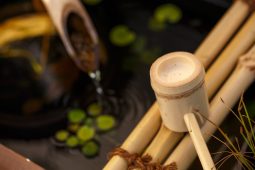Picture this: a typical Japanese junior high school class is suddenly interrupted by the entrance through an open window of a large bee which swooping low and erratically over the heads of the students causes them to duck and squeal creating quite a commotion. Their teacher, a gentleman in his early 50’s, beams at the class and announces:
虫を無視してください。
mushi o mushi shite kudasai.
“Please ignore the bug.”
Silence falls across the class who turn to fix their teacher with a withering glare. Their teacher’s smile remains undaunted. This is not the first time he has made this joke, and it will not be the last.
The joke above is a good example of an oyaji gyagu (おやじギャグ). Oyaji is a slightly derogatory term for a middle-aged man and gyagu means simply “gag”. The humor here relies on the simple repetition of a homonym mushi which in the first instance means “bug” (虫) and in the second means “ignore” (無視). Oyaji gags rely heavily on such simple wordplay which is called dajare (駄洒落=”pun”). In fact if you asked most people what the difference is between oyaji gags and dajare they would be hard pressed to explain it. The main point seems to be that while dajare can be funny, oyaji gags invariably are not. They are in effect the equivalent of dad jokes in the English language. Why certain men on reaching middle age find themselves attracted to this kind of humor remains a mystery. On the one hand the jokes are simple and inoffensive, but on the other hand they are rarely original and young people tend to find them “lame ” or as the Japanese would say samui (寒い=”cold”). Some common factors that might increase this negative view of oyaji gags, are the joke-teller’s incessant repetition of the exact same joke, and his evident delight in the groans and eye-rolling that it elicits.
Nevertheless, this type of Japanese humor can be useful for language learners who want to build up their vocabulary. These simple and short Japanese jokes are by their nature very easy to understand, and to remember. Their clean subject matter also puts you at no risk of causing offense. And besides some of these Japanese anti-jokes are quite funny in a they’re-so-bad-they’re-good kind of way. Here are some examples that demonstrate the potential of these Japanese one-liners and funny phrases.
Try this one when no one answers a phone in time:
- 電話に誰もでんわ
- denwa ni dare mo den wa
- “Nobody answers the phone.”
In Japanese denwa ni deru (電話に出る) means to answer the phone. The negative form of deru (出る) is denai (出ない) which in casual speech can be abbreviated to den. Add wa to the end for emphasis and you have your joke!
Here’s one you can use when eating out:
- 鯛の刺身が 食べたいな
- tai no sashimi ga tabetai na
- “I’d really like to eat some sea bream sashimi.”
Tai (鯛) is a type of fish called “sea bream” in English, and tabetai (食べたい) simply means “want to eat”. Place some heavy emphasis on the final tai in tabetai for full effect.
Some gags work by shoehorning some English into the joke:
- 雷はもう たくサンダー
- kaminari wa mou takusan da
- “There is a lot of thunder now.”
Kaminari (雷) means “thunder “, and takusan (たくさん) means “a lot”, but the end of the line is written in katakana as サンダー (sandaa) which sounds a lot like the English “thunder”.
This next one could be pertinent when watching recent news:
- ドナルドが怒鳴るど
- donarudo ga donaru do
- “Donald is shouting”
And for a meta-joke, use this when someone asks you the time:
- 「今、何時?」「おやじ!」
- 「ima, nan ji? 」 「oyaji! 」
- “What time is it?” “The Middle Ages!”
For more unconventional language study methods check out our articles on studying with manga and tongue twisters:








